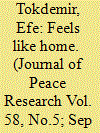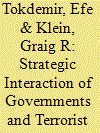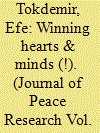|
|
|
Sort Order |
|
|
|
Items / Page
|
|
|
|
|
|
|
| Srl | Item |
| 1 |
ID:
182670


|
|
|
|
|
| Summary/Abstract |
How do people react to foreign actors’ involvement in a conflict in a third party? Many studies have explored how individuals react to their country’s foreign policy choices, as well as how they react to the policies targeting their countries. Yet, we know less about how they form their attitudes regarding the policies not directly aiming at their own countries, and hence, their well-being. Building on intergroup relations and employing a social psychological approach, this article argues that identity serves as a heuristic through which individuals evaluate foreign actors, and their policies targeting in- and out-group members living abroad. Conducting a survey experiment in Turkey, I test my claims in the context of the Syrian Civil War. The findings of the experiments reveal that transnational identity ties have an impact on attitude formation: Turks and Kurds express positive/negative attitudes towards the USA and Russia conditional on whether their involvement to the conflict favor/disfavor their in-group/out-group across the border. Broadly speaking, the results show that domestic cleavages are of importance in predicting the public’s reaction to the developments in international politics, which implies a necessity of taking domestic politics in designing soft power promotion and public diplomacy strategies for many global and regional powers in attempting to win hearts and minds abroad.
|
|
|
|
|
|
|
|
|
|
|
|
|
|
|
|
| 2 |
ID:
144089


|
|
|
|
|
| Summary/Abstract |
Violence against civilians is not the only tool among the arsenal of terrorists; it is only one of many. Up until now, there did not exist any quantitative data on the different strategies adopted by terror groups that measured the group’s popularity or its public support. The Reputation of Terror Groups dataset (RTG) addresses this void. To understand which terror groups build different types of reputation, to analyze the consequences of reputation building and how reputation changes with and influences conflict dynamics, we need to be able to measure the loaded concept of reputation. RTG is the first systematic measure for the reputation of terror groups across countries or time. The dataset includes 443 terror groups operating across 31 years, which makes a total of 2,641 observations. The large sample size of the RTG dataset allows comparisons of popularity among groups. Additionally, the dataset adopts a multivariable approach by examining multiple aspects of both positive and negative reputation building. Another novelty of the dataset is its measure of reputation with regard to each target, mainly its constituency and target audience. The RTG data can help us come up with new and novel ways of understanding terror groups, and contribute to bridging the gap between micro- and mezzo-level studies in the literature by showing how terror groups adopt different strategies in their constituency and target audience to pursue their goals. In this article, we give an overview assessment of the RTG dataset, display some interesting trends in the data, and explain the data collection procedure, its challenges, and its limitations.
|
|
|
|
|
|
|
|
|
|
|
|
|
|
|
|
| 3 |
ID:
182543


|
|
|
|
|
| Summary/Abstract |
When governments’ ability to maintain power is threatened, they use any tool at their disposal to re-establish or boost their survival. In this paper, we theorize dyadic strategic choices and interactions between governments and domestic terrorist groups in times of economic turmoil. We contend that governments are more likely to increase their targeting of domestic terrorist groups, which provides legitimate opportunities to divert public attention from economic concerns and rally individuals around the flag. Meanwhile, observing such incentives, domestic terrorist groups make strategic decisions similar to those of interstate actors by either decreasing their attacks (strategic conflict avoidance) or increasing them (strategic conflict seeking) to add an inability to provide safety and security to the government’s existing struggles. We test these competing hypotheses by leveraging two recently released event datasets focusing on the Turkey-PKK conflict. Our findings contribute to the terrorism studies literature on decision-making and strategic choices, and broader scholarship about conflict processes by testing conflict dynamics at the domestic level.
|
|
|
|
|
|
|
|
|
|
|
|
|
|
|
|
| 4 |
ID:
156661


|
|
|
|
|
| Summary/Abstract |
Foreign aid is a policy tool implemented with the purpose of fostering both hard and soft power abroad. Yet, previous research has not probed the effects of US foreign aid on public attitudes toward the US in the recipient countries. In this article, I argue that US foreign aid may actually feed anti-Americanism: aid indirectly creates winners and losers in the recipient countries, such that politically discontented people may blame the US for the survival of the prevailing regime. Drawing on Pew Research for Global Attitudes and on USAID Greenbook datasets, I focus on determining both the conditions under which foreign aid exacerbates anti-Americanism and the type of aid most likely to do this. The findings reveal that political losers of the recipient countries are more likely to express negative attitudes toward the USA as the amount of US aid increases, whereas political winners enjoy the results of US aid and view the USA positively accordingly. Moreover, the effect of US aid on attitudes toward the USA is also conditional on the regime type. While US aid increases the likelihood of anti-American attitudes among the losers in non-democratic countries, it decreases the likelihood of anti-Americanism among the losers in democratic ones. This article has important implications for policy in terms of determining how and to whom to provide aid in the context of the possible ramifications of providing aid at the individual level.
|
|
|
|
|
|
|
|
|
|
|
|
|
|
|
|
|
|
|
|
|